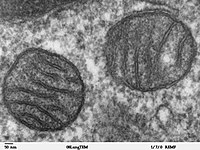
Photo from wikipedia
Glucose produces, through glycolysis, pyruvate, a substrate for mitochondrial metabolism. Mitochondrial metabolism generates signals for insulin exocytosis, which include ATP and other as yet unidentified molecules. Although important roles of… Click to show full abstract
Glucose produces, through glycolysis, pyruvate, a substrate for mitochondrial metabolism. Mitochondrial metabolism generates signals for insulin exocytosis, which include ATP and other as yet unidentified molecules. Although important roles of mitochondrial metabolism of glucose for insulin secretion is established, roles of glycolysis are not completely understood. Does glycolysis merely produce pyruvate for mitochondrial metabolism or generate its own signal? To study this question, we have created mitochondrial pyruvate carrier 2 (Mpc2) knockout MIN6 cells by the Crispr technology. We first generated MIN6 cells expressing MPC2-Flag under the control of Tet3G transcriptional activator, to assure mitochondrial metabolism of glucose in a condition of Mpc2 alleles being knocked out. Then, stop codons followed by the zeocin or puromycin-resistant gene units were introduced in the second exons of the gene. We have confirmed a complete loss of endogenous MPC2 expression by Western blot analyses and these cells were maintained in the presence of doxycycline, expressing MPC2-Flag. Upon withdrawal of doxycycline, glycolytic flux estimated by 5-[3H]glucose utilization was unaltered at 5 mM glucose but reduced by 37.2% ± 1.2% (Mean ± SE, n = 3, p Disclosure H. Ishihara: Advisory Panel; Self; Astellas Pharma Inc. Research Support; Self; Daiichi Sankyo, Eli Lilly Japan K.K., Kowa Company, Ltd., Merck Sharp & Dohme Corp., Mitsubishi Tanabe Pharma Corporation, Nippon Boehringer Ingelheim Co. Ltd., Novartis Pharma K.K., Novo Nordisk Inc., Ono Pharmaceutical Co., Ltd., Sanofi. H. Nishioka: None. M. Yamana: None. A. Nagasawa: None. M. Kosuda: None. M. Koike: None. G. Kohno: None. H. Saito: None.
Journal Title: Diabetes
Year Published: 2020
Link to full text (if available)
Share on Social Media: Sign Up to like & get
recommendations!